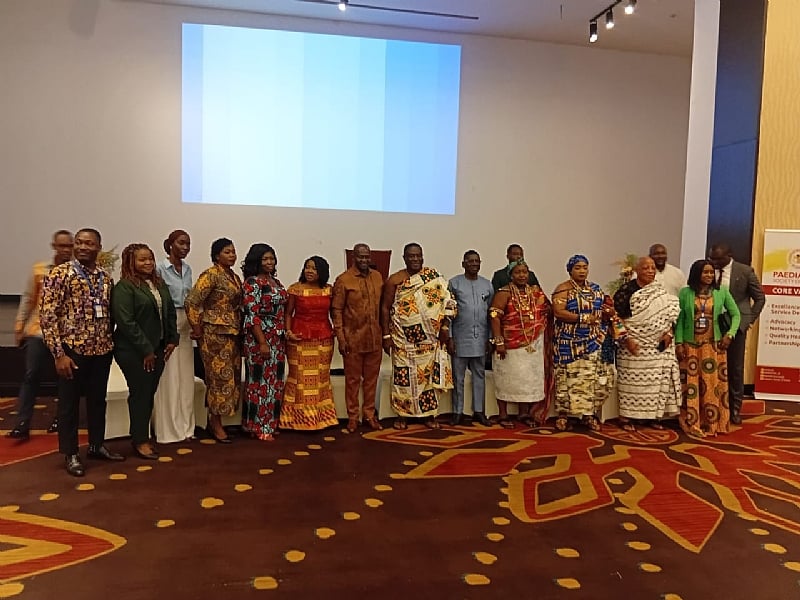First Lady Lordina Mahama’s address at the 2025 Annual General and Scientific Meeting (AGSM) of the Paediatric Society of Ghana underscored a critical yet often overlooked aspect of child healthcare: mental well-being. Her call for the integration of mental health services into child healthcare strategies highlighted the need for a holistic approach, addressing not only the physical ailments of children but also their emotional and psychological development. This comprehensive perspective recognizes that a child’s overall well-being is intricately intertwined with their mental state, and neglecting this crucial component can have long-term consequences for their development and future prospects. Mrs. Mahama’s emphasis on mental health brought a crucial dimension to the forefront of the discussion on child healthcare delivery in Ghana, advocating for a more comprehensive and inclusive approach.
The theme of the AGSM, “Bridging the Gaps and Building Resilience in Child Health Care Delivery Across Ghana,” provided a fitting backdrop for Mrs. Mahama’s message. It acknowledged the existing disparities in healthcare access, particularly for children in rural and underserved communities. These disparities often lead to preventable diseases and developmental challenges, further emphasizing the urgency of bridging these gaps and strengthening healthcare delivery systems. Building resilience in child healthcare, as Mrs. Mahama pointed out, goes beyond merely addressing physical health needs; it requires a concerted effort to foster emotional, psychological, and social development, creating a foundation for children to thrive in all aspects of their lives.
The First Lady’s address highlighted the specific challenges faced by children in remote areas, who often lack access to essential health services, including mental health support. This lack of access can have profound consequences, hindering their development and perpetuating cycles of disadvantage. Mrs. Mahama’s call to action urged healthcare professionals to actively address these disparities by leveraging technology, such as telemedicine, to reach remote communities. She also emphasized the importance of training community health workers and collaborating with local organizations to build capacity and ensure sustainable access to mental health services.
Dr. Hilda Mantebea Boye, President of the Paediatric Society of Ghana, echoed Mrs. Mahama’s concerns and reinforced the importance of Universal Health Coverage (UHC) as a means to ensure equitable access to quality healthcare for all children, regardless of their socio-economic background or geographical location. UHC aims to eliminate financial barriers and ensure that everyone can access the healthcare services they need without suffering financial hardship. Dr. Boye’s advocacy for UHC aligns with the overarching goal of bridging the gap in healthcare access and building a more resilient and equitable healthcare system for Ghana’s children.
Dr. Boye’s address also highlighted the significant disparities in healthcare access between urban and rural areas, a critical challenge that needs urgent attention. She advocated for a multi-pronged approach to address this issue, including strengthening primary care services, expanding specialized pediatric services, and adopting innovative solutions like telemedicine to overcome geographical barriers. Strengthening primary care ensures that children have access to preventative care and early interventions, while expanded pediatric services provide specialized care for more complex medical needs. Telemedicine, on the other hand, extends the reach of healthcare professionals to remote communities, bridging the geographical divide and ensuring access to timely medical consultations and interventions.
Dr. Boye emphasized the crucial role of collaborative efforts, sustainable financing, and a multi-agency approach in building a robust and resilient healthcare system. Collaboration among various stakeholders, including government agencies, healthcare professionals, and community organizations, is essential to effectively address the complex challenges in healthcare delivery. Sustainable financing ensures the long-term viability of healthcare programs and initiatives, while a multi-agency approach fosters a coordinated and integrated response to healthcare needs, maximizing the impact of interventions. By working together and pooling resources, Ghana can build a healthcare system that safeguards the health and well-being of its children, ensuring a brighter future for generations to come. Thus, the AGSM served as a crucial platform for advocating for comprehensive child healthcare, emphasizing the integration of mental health services and addressing the disparities in access, particularly for children in underserved communities. The meeting’s focus on building resilience in child healthcare delivery underscores the importance of not only addressing immediate health needs but also investing in long-term strategies to ensure the overall well-being of Ghana’s children.


